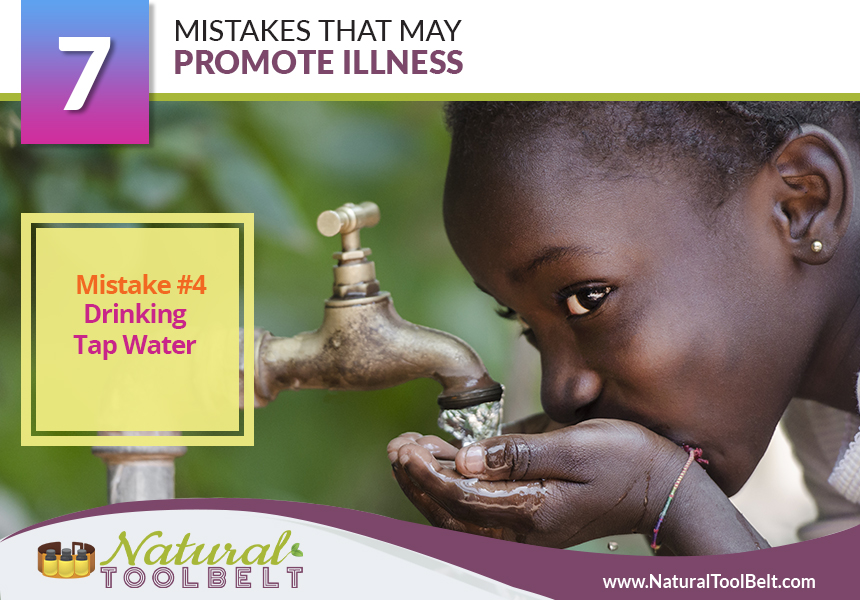People often act as though they are poor victims of a vicious assault by a pathogen when they get sick; what they don’t often realize is that their lifestyle provided the proper environment for the pathogen to do what it was created to do. The job of any pathogen is to “break down decaying matter.” Your job must be to “not be decaying matter” by keeping your body functioning and adapting at its peak potential. Your responsibility to yourself is to use your lifestyle to strengthen your immune system so that you can overcome the stressors of life. Here, we will share with you some major things most individuals in our society do to promote illness.
First, we’ll go over how sleep deprivation affects you. Then, we’ll talk about the perks of going outside and why you shouldn’t stay inside all the time. After that, we’ll talk about the dangers of municipal tap water and how sugar can damage your immune system. Finally, we’ll talk about chronic dehydration and sugar and vitamin C. Once you have finished reading, you will understand the importance of steering away from these major things that promote illness, thus allowing you to improve your overall health.

1Lack Of Quality Sleep
Quality sleep is one of the most fundamental nutrients that every person needs to perform at their optimal level. Sleep deprivation creates a heightened stress response within the body that disrupts normal healing and tissue rejuvenation processes. When the body has a heightened stress response, it lowers immune coordination and increases inflammatory processes.
We need at least seven to nine hours of sleep each night. Our ancestors were regularly getting eight to nine hours of sleep, if not more, each night. We typically try to get by with less than seven, and it leads to chronic stress, inflammation, and immune dysregulation. If you are struggling with sleep, be sure to address it and get it corrected, as it will play a huge role in your quality of life!

2Not Getting Outside And Getting Grounded
The body is a living matrix of energetically charged biochemical circuits that are charged and coordinated through the activity of the central nervous system. The Earth itself is regulated by subtle but dynamic electrical circuits. The electrical crosstalk between the Earth and the central nervous system helps program trillions of biochemical reactions. Getting the body exposed to these biochemical circuits is very calming and healing for the body.
This is why there are so many huge fans of grounding, where you get your skin directly exposed to grass, dirt, sand, or even concrete to get these healthy electromagnetic frequencies. This is much harder to do in the wintertime, but take advantage of any chance you get to even get one minute of direct contact with the Earth and, ideally, some sun. If you live in a northern snowy climate, consider a beach vacation in the wintertime to get grounded and get good sun exposure.

3Regularly Staying Indoors
We spend as much as 90% of our lives indoors nowadays, and researchers are investigating our exposure to indoor pollutants as contributing causes to the rising incidence of chronic illnesses in our society. According to the EPA, our indoor environment is two to five times more toxic than our outdoor environment. In some cases, the air measurements indoors are 100 times more polluted.
By spending so much time indoors, we are also missing out on the protective factors inherent in nature. When outside, we are exposed to low levels of natural pathogens, and our immune system can gently adapt to these. Being outside also offers the benefit of fresh air, sunlight, vitamin D3, and, if you take off your shoes, the electrons from the ground.

4Drinking Tap Water
Municipal water is extraordinarily toxic to the body and destroys the immune system; this water is loaded with environmental toxins, such as chlorine, DBPs, arsenic, heavy metals, and fluoride. Proper water filtration is essential to remove these chemical agents. High-quality reverse osmosis systems are one of the very few water systems that can effectively remove fluoride. Add a pinch of pink salt (1/4 teaspoon per gallon) to replace any lost minerals from the reverse osmosis process. You can also get RO systems that take out all the bad stuff and automatically remineralize and bring up the pH of the water.
Another great portable water system that will get the bad stuff out and keep the good stuff in is the Berkey system. The best water is the Synergy Science hydrogen water, which is what many use at home, as it is powered by molecular hydrogen that reduces oxidative stress in the body and improves immune function. Parents should teach their children not to use municipal water fountains but instead to carry filtered bottled water; ideally, this is from your home water system, but you can also get bottled water from time to time. Do your best to avoid plastic bottles as much as possible, and instead, use glass or stainless steel bottles to reduce the consumption of toxic chemical residue that leaches out of the plastic and into the water that you are drinking. Your body can handle and detoxify a little of this, but if you are always drinking from plastic bottles, you are going to build a high toxic load in your body.

5Consuming Too Much Sugar
Consuming sugar feeds parasites within your body and depletes your system of critical immune-boosting nutrients, such as vitamin C, glutathione, zinc, etc. Sugar also feeds the development of abnormal tissue and cancerous growth. When sugar and starch are metabolized in your body, it breaks down into a simple molecule called glucose that is used for energy production.
In the 1970s, Dr. John Ely discovered the glucose-ascorbate antagonism (GAA) theory. Glucose and vitamin C (ascorbate) have a very similar chemical makeup. This theory proposes that elevated glucose levels compete and effectively restrict vitamin C from entering the cells. Both glucose and vitamin C depend upon the pancreatic hormone insulin and its signaling effects to get into the cells.

6Not Drinking Enough Water
All life begins in water; even the developing fetus is surrounded by water. A water rationing system takes effect immediately in response to any form of dehydration. A neurotransmitter named histamine becomes active and redistributes water throughout the body. Some areas of the body are more important than others – the order of circulatory priority (an inborn triage system) is the brain, lungs, liver, kidneys, and glands; of least importance are the muscles, bones, and skin. Histamine’s responsibility is to ensure that these vital organs have enough water to function properly during times of dehydration; if the dehydration issues become chronic, then water must be taken from major regions within the body.
Additionally, chronic dehydration can cause histamine to become excessively active, leading to symptoms that are often mistaken for other disorders; the most common symptoms associated with dehydration and elevated histamine include allergies, asthma, dyspepsia, colitis, constipation, rheumatoid arthritis, headaches, and chronic pain. Be sure to drink at least half of your body weight (lbs) in ounces of clean, filtered water each day. If you weigh 150 lbs, then you should drink a minimum of 75 ounces of water daily. In the colder months, people are not typically doing this. One way that can help is to drink warm water with lemon or herbal teas.

7Insufficient Vitamin C Intake
There is an important receptor called the GLUT-1 receptor that activates in response to insulin to allow both glucose and vitamin C to enter the cellS. However, glucose has a greater affinity for the insulin receptor. This means that the greater the content of circulating blood sugar, the less vitamin C will enter the cell.
White blood cells have more insulin pumps than any other type of cell and may contain 20 times the amount of vitamin C as other cells; they also need 50 times more vitamin C inside the cell than in the blood plasma to handle the oxidative stress that occurs when they encounter a pathogenic substance. When white blood cells encounter pathogenic bacteria and viruses, they must ingest or phagocytize these organisms to neutralize them. The phagocytic index measures how effective a particular white blood cell is at destroying viruses, bacteria, and cancer cells. Elevated blood sugar impairs this phagocytic index. A blood sugar of 120 reduces the phagocytic index by 75%.

When people get sick, they often act as though they are poor victims of a vicious assault by a pathogen; something that people often don’t realize is that their lifestyles provided the proper environment for the pathogen to do what it was created to do. “Breaking down decaying matter” is the job of any pathogen. By keeping your body functioning and adapting at its peak potential, your job must be to “not be decaying matter.” Using your lifestyle to strengthen your immune system so you can overcome the stressors of life is your responsibility to yourself. Here we shared with you some major things most individuals in our society do to promote illness.
First, we went over how sleep deprivation affects you. Then, we talked about the perks of going outside and why you shouldn’t stay inside all the time. After that, we discussed the dangers of municipal tap water and how sugar can damage your immune system. Finally, we closed with chronic dehydration and sugar and vitamin C. Now that you have finished reading, you understand the importance of steering away from these major things that promote illness, thus allowing you to improve your overall health.


